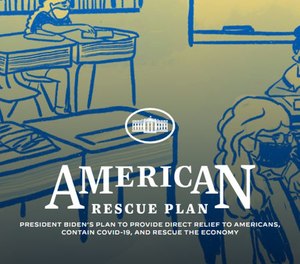
The compliance and reporting requirements require carefully managing deadlines, keeping accurate records and following established procurement processes
In a previous article , I discussed how the American Rescue Plan provides significant direct formula grant funding for state, tribal and local governments. These funds are also referred to as Coronavirus State and Local Fiscal Recovery Funds , CSLFRF, CLFRF or Fiscal Recovery Funds. Many cities and counties with populations over 50,000 have already received one of two distributions of funds directly from the federal government. Municipalities with populations below 50,000, referred to as non-entitlement units of local government or NEUs, should receive the first distribution from their states within the next month or so. We are seeing some states with portals up and ready for NEUs while others are still developing their portals.
With money now in the hands of some local governments, the U.S. Department of Treasury has recently offered additional Compliance and Reporting Guidelines for State and Local Fiscal Recovery Funds – for both direct recipients as well as NEUs. Following are some highlights of those guidelines as well as resource links to the overall guidance.
Understanding the compliance and reporting requirements in the American Rescue Plan is essential to helping your community responsibly spend and manage funds post-award.
Per 2 CFR 200.303, your organization must develop and implement effective internal controls to ensure that funding decisions under the SLFRF award constitute eligible uses of funds, and document determinations.
Best practice tip: Document how the cost and project was determined. Align with the Interim Final Rule on use of funds.
Recipients must implement robust internal controls and effective monitoring to ensure compliance with the Cost Principles, which are important for building trust and accountability.
Best practice tip: Ensure the money is spent how it was intended to be spent and retain documents to support.
The Uniform Guidance establishes in 2 CFR 200.319 that all procurement transactions for property or services must be conducted in a manner providing full and open competition, consistent with standards outlined in 2 CFR 200.320, which allows for non-competitive procurements only in circumstances where at least one of the following conditions is true: the item is below the micro-purchase threshold, the item is only available from a single source, the public exigency or emergency will not permit a delay from publicizing a competitive solicitation, or after solicitation of a number of sources, competition is determined inadequate.
Best practice tip: You must still follow your procurement process for purchases with this funding source.
Direct municipality recipients will be required to submit one Interim report and a quarterly Project and Expenditure report through the end of the award period on December 31, 2026.
The Interim report will include expenditures by category at the summary level from the date of award to July 31, 2021, and, for states and territories, information related to distributions to non-entitlement units. Recipients must submit their Interim report to Treasury by August 31, 2021. Non-entitlement units of local government are not required to submit an Interim report.
Best practice tip: Cities will need a valid DUNS number to meet the reporting requirements for the Coronavirus Local Fiscal Recovery Fund.
Here is more detail on reporting requirements by recipient type including NEUs, found on page 12 of the Compliance and Reporting Guidance .
In addition to the above requirements, non-entitlement units will be asked to provide their NEU Recipient Number (a unique identification code for each NEU assigned by the state as part of the request for funding), a copy of signed award terms and conditions agreement, a copy of signed assurances of compliance with Title VI of the Civil Rights Act of 1964, and a copy of actual budget documents validating the top-line budget total provided to the state as part of the request for funding. See Guidance on Distribution of Funds to Non-entitlement Units of Local Government for more details.
In the rush to secure funds for your organization, it’s important not to lose sight of what’s required after the money comes through. The compliance and reporting requirements in the American Rescue Plan are not unusual, but they do require carefully managing deadlines, keeping accurate records and following established procurement processes. Pay attention to the details to minimize headaches down the road.
Copyright © 2025 PoliceGrantsHelp.com. All rights reserved.

